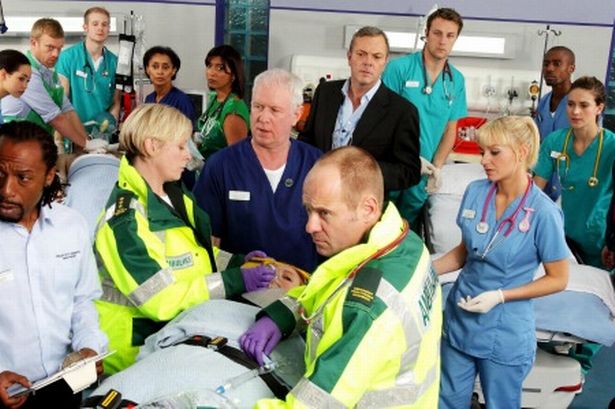A scene from the popular British TV soap “Casualty”
Bloomberg View reported earlier this week that “U.S. Exaggerates Islamic State Casualties”, and a headline in the Detroit News read: “Marine casualties from Fla. helicopter crash identified”. The context of the statements leaves us in no doubt about what is meant by the word casualty here: it’s being used in its most extreme and tragic sense — to signify death. (In its plural form it’s commonly used to denote the death-count from a war or accident.)
We also meet the word casualty in a slightly different incarnation. “The unseen casualties of Japan’s lost decades suffer in silence”, reported Sahoko Kaji recently in the Financial Times, and “The Journalistic Casualties of The Guardian’s Erroneous Whisper Story” was a headline in New York magazine a few days ago. Again there’s no ambiguity here in the sense of the word, which can also refer to someone injured (in a war or accident) or a person or thing lost in or badly affected by an event or phenomenon. (In the UK there’s an additional meaning: you go to “casualty” — just as an American might head to the ER — for treatment after an accident or emergency.)
Now let’s turn to the adjective casual, so close in spelling to the ominous noun, and suddenly the mood is lifted. Whether it describes something happening by chance (i.e. not planned or expected), informal (i.e. calling for ordinary dress or behavior), or done without much thought, effort or concern, the word seems very far away in meaning or nuance from the mortal or grave sense of casualty, which is invariably associated with disaster. Can the words possibly be related?
It appears that they are, surprisingly. They are both born of chance.
The earliest definition of casual dates back to late Middle English, according to the Oxford English Dictionary, when it meant “due to, characterized by, or subject to chance; accidental, or fortuitous.” And this isn’t too far from another definition dating from that period: “occurring unpredictably; irregular; occasional.” The first meaning of casualty listed in the OED, also dating from late ME, is simply “chance” — although it’s rarely used in that sense any more. Casualty also referred at that time to an incidental charge or payment, as well as to “a chance occurrence; an accident, a mishap, a disaster”.
It might surprise you to discover that this similarity in early meaning between casualty and casual is not one of accident or chance. Indeed, as the OED confirms, casualty derives from the adjective at its core, following the model of words such as royalty and penalty. Dating back to the late 14th century, the older word casual — originally meaning “subject to or produced by chance” — is from the Middle French casuel, via the Late Latin casualis (“by chance”) from the Latin casus, defined as “chance, occasion, opportunity; accident, or event”.
The Online Etymology Dictionary offers a timeline for the later divergent definitions of noun and adjective, when they each began to shed their main association with chance. Casualty‘s meaning of “losses in numbers from a military or other troop” can be traced back to the late 15th century, and only much later, from 1844, did it start to refer to “an individual killed, wounded, or lost in battle.” On casual and its journey towards informality and lack of concern, the OED dates its sense (referring to people) of “not to be depended on, unmethodical” to 1883, and of “showing a lack of interest” from 1916. Its most recent and usual sense of “informal”, referring to clothes and behavior etc., dates from 1939.
* * *
Our noun for the state of being casual is casualness (and not, obviously, casualty). Casuality had some currency in the 16th and 17th centuries, meaning — like early casualty — “a casual item of income or chance” (OED), and later it took on the sense of casualness in the late 19th century. However, it’s now obsolete.
* * *
Full Oxford English Dictionary definitions:
Casualty (noun):
1. Chance – now rare (late Middle English); 2. A chance occurrence; an accident, a mishap, a disaster (late Middle English)
b. a person killed or injured in war or an accident; a thing lost or destroyed. (mid 19th century)
3. An incidental charge or payment (late Middle Eng)
4. Subjection to chance, uncertainty (early 16th to early 19th century)
5. (UK): the part of a hospital where casualties are attended to (mid 19th century)
Casual (adj):
1. due to, characterized by, or subject to chance; accidental, fortuitous (late Middle English)
2. occurring unpredictably; irregular; occasional (late Middle English)
3. frail, precarious, unreliable (early 16th to early 18th century)
4. occurring or brought about without design or premeditation; having no specific plan, method, motivation, or interest; performed or entered into casually; spec. designating or pertaining to sex between individuals who are not regular or established sexual partners. (mid 17th century)
5. of a person, action, etc.: unmethodical, careless; unconcerned, uninterested; informal, unceremonious (late 19th century) b. of an item of clothing: suitable for informal wear. (mid 20th century)
* * *


I adore this post, but I had to start skimming it quickly because of the little floaty share button. Because of my disability, it gave me a headache. Trying to cover it up meant I had to cover half the screen. Please make it stationary relative to the screen to eliminate its pain-inducing bounciness! Thank you for your consideration of this matter.